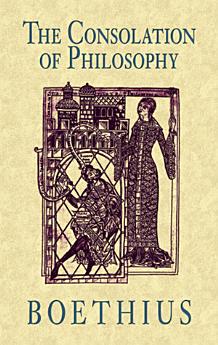The Consolation of Philosophy
mar 2012 · Courier Corporation
2,0star
1 rəyreport
E-kitab
144
Səhifələr
reportReytinqlər və rəylər doğrulanmır Ətraflı Məlumat
Bu e-kitab haqqında
One of the most influential books in the history of Western thought, The Consolation of Philosophy was written in a prison cell by a condemned man. Anicius Manlius Severinus Boethius (c. 480–524) was a Roman scholar, theologian, philosopher, and statesman. Imprisoned by the Ostrogothic king Theodoric, probably on trumped-up subversion charges, he was thrown into a remote prison where he was eventually executed.
While awaiting his fate, he wrote this dialogue in alternating prose and poetry between himself and his spiritual guardian. Its subject is human happiness and the possibility of achieving it in the midst of the suffering and disappointment that characterize human existence. As Richard H. Green notes in the introduction, "For the reader of the Christian Middle Ages, The Consolation of Philosophy celebrated the life of the mind, or reason, and the possibility of its ultimate victory over the misfortunes and frustrations which attend fallen man's pursuit of transitory substitutes for the Supreme Good which alone can satisfy human desires."
Mr. Green's translation is quite literal in order to remain as faithful as possible to Boethius's original meaning. He has also provided an informative introduction and notes. The result is a superbly accessible edition that still exercises a powerful influence on contemporary thinkers and theologians and represents a source of comfort and solace for the general reader.
While awaiting his fate, he wrote this dialogue in alternating prose and poetry between himself and his spiritual guardian. Its subject is human happiness and the possibility of achieving it in the midst of the suffering and disappointment that characterize human existence. As Richard H. Green notes in the introduction, "For the reader of the Christian Middle Ages, The Consolation of Philosophy celebrated the life of the mind, or reason, and the possibility of its ultimate victory over the misfortunes and frustrations which attend fallen man's pursuit of transitory substitutes for the Supreme Good which alone can satisfy human desires."
Mr. Green's translation is quite literal in order to remain as faithful as possible to Boethius's original meaning. He has also provided an informative introduction and notes. The result is a superbly accessible edition that still exercises a powerful influence on contemporary thinkers and theologians and represents a source of comfort and solace for the general reader.
Reytinqlər və rəylər
2,0
1 rəy
Müəllif haqqında
Born of a distinguished family, Boethius received the best possible education in the liberal arts in Athens and then entered public life under Theodoric the Ostrogoth, ruler of Italy. Boethius obtained the highest office, but was later accused of treason, imprisoned, and executed. In the dungeon of Alvanzano, near Milan, during his imprisonment, he composed "The Consolation of Philosophy," a remarkable piece of prose literature as well as philosophy. Boethius's outlook, like that of all the Church Fathers, was Platonistic, but he preserved much of the elementary logic of Aristotle. Boethius reported in his commentaries the views of Aristotelians even when they disagreed with his Platonism. Thus he created an interest in Aristotle in subsequent centuries and provided a basis for the introduction of Aristotle's works into Europe in the twelfth and thirteenth centuries. Boethius was put to death in 526.
Bu e-kitabı qiymətləndirin
Fikirlərinizi bizə deyin
Məlumat oxunur
Smartfonlar və planşetlər
Android və iPad/iPhone üçün Google Play Kitablar tətbiqini quraşdırın. Bu hesabınızla avtomatik sinxronlaşır və harada olmağınızdan asılı olmayaraq onlayn və oflayn rejimdə oxumanıza imkan yaradır.
Noutbuklar və kompüterlər
Kompüterinizin veb brauzerini istifadə etməklə Google Play'də alınmış audio kitabları dinləyə bilərsiniz.
eReader'lər və digər cihazlar
Kobo eReaders kimi e-mürəkkəb cihazlarında oxumaq üçün faylı endirməli və onu cihazınıza köçürməlisiniz. Faylları dəstəklənən eReader'lərə köçürmək üçün ətraflı Yardım Mərkəzi təlimatlarını izləyin.






